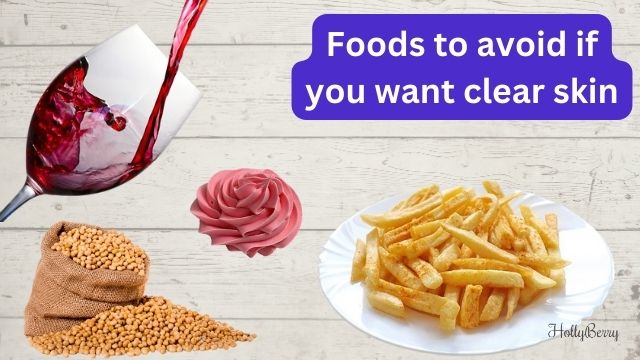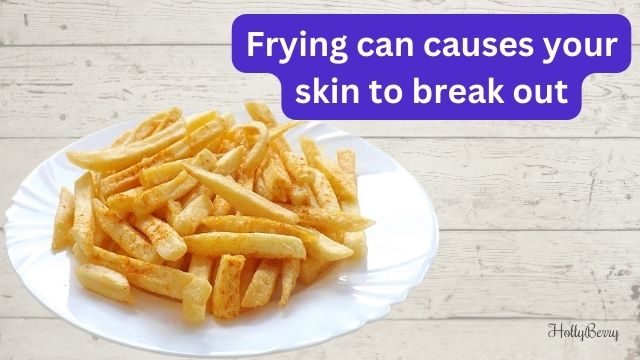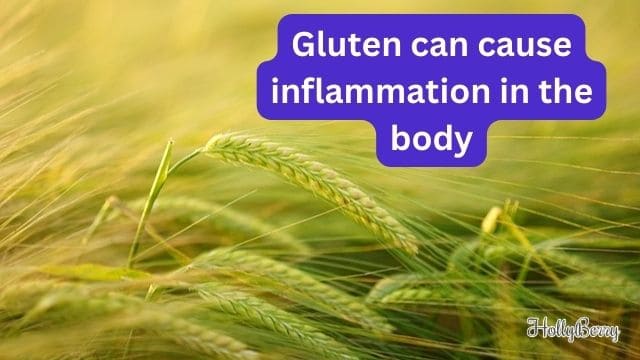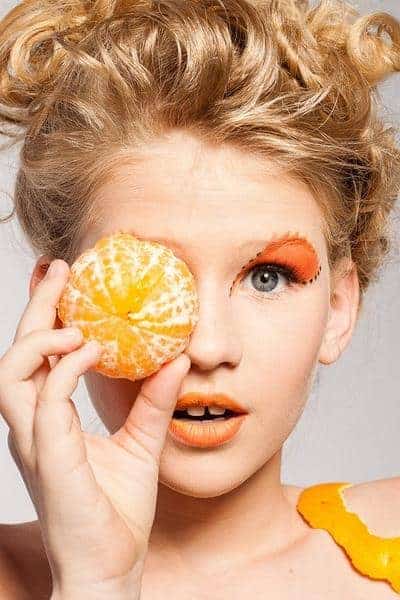
Introduction:
If you’re new to the world of clear skin, it can be hard to know what foods are good for your complexion. There are many factors that determine how your body handles certain foods, and sometimes what’s considered healthy for one person is actually bad for another.
But I promise—if you keep an eye on these foods and avoid them as much as possible, you’ll be able to enjoy beautiful skin in no time!
Benefits of Eating Right to Get Clear Skin
We all know that healthy eating is an important part of staying healthy. But did you know that eating right can also help you look better and feel better?
If your skin is looking dull, dry, or blotchy, it may be time to start thinking about what you’re putting in your body. It’s true—eating the right foods for clear skin can help improve the quality of your skin and make it feel softer. Here are a few foods to avoid if you want clear skin:
Fried foods

Fried foods are high in fat and calories, which can clog pores. The excess oil from frying causes your skin to break out and become oily, which makes it more prone to breakouts.
Additionally, fried foods contain a lot of salt—which causes water retention in the body. This leads to puffy eyes, dark circles around the eyes (crows’ feet), and other signs of aging that can make you look older than you actually are!
Sugar:
Sugar is a skin irritant, which means it increases inflammation in the body. Inflammation is what causes acne and breakouts, so by avoiding sugar you can reduce your chances of getting pimples (and also help prevent them from returning).
Sugar also has an effect on the oil glands in your face—which means that if you eat too many sugary foods or drink too many sodas during the day, those glands will overproduce oil. This causes clogged pores and blackheads that can lead to acne breakouts!
Dairy:
Dairy products can be a problem for some people. If you’re lactose intolerant, allergic to dairy, or have acne-prone skin—or if your doctor has advised you not to consume it—you should limit your intake of dairy products as much as possible.
Dairy is not just the stuff that comes in milk cartons and yogurt containers; it’s also found in butter and cheese (both of which are very high in fat). If you’ve ever had an upset stomach after eating too many of these foods, it’s likely due to the presence of lactose in them: a sugar found only in milk that makes up about 80% of cow’s milk by volume.
This means that if someone who doesn’t normally get sick from drinking raw cow’s milk were suddenly forced into consuming large amounts without any other food sources nearby (like at their day job), they might develop symptoms such as diarrhea or vomiting.
Gluten:

Gluten is a type of protein found in wheat, barley, rye, and their by-products. The problem with gluten is that it can cause inflammation in the body and trigger symptoms such as bloating, gas, and diarrhea.
If you’re sensitive to gluten (or suspect that you might be), try avoiding these foods:
- Grains like wheat flour
- Barley products such as malt syrup or malt vinegar
Alcohol:

Alcohol can cause acne, dehydration, and dry skin. It can also cause premature aging if you drink too much of it.
Alcohol is a depressant that slows down your metabolism and makes you feel sluggish—not the best feeling when you’re trying to get rid of blemishes on your face!
Processed foods:
Processed foods are loaded with salt, sugar, and fat. They’re often packed with preservatives that make them last longer on your grocery shelf.
Processed foods also have little or no nutritional value: they typically contain lots of calories but few nutrients—and these nutrients can be hard to absorb if eaten in excess.
Trans fats:
Trans fats are a type of fat that’s been chemically altered to become solid at room temperature. This can make food taste bland and dull, but it also has a negative effect on the way you look and feel.
Trans fats are found in processed foods like bread, crackers, cookies, and other baked goods that contain partially hydrogenated vegetable oils (PHVO). They’re also found in some fast food items as well as snack foods like potato chips or microwave popcorn bags.
Some people avoid trans fats by choosing to eat more whole grain bread instead of processed ones; others prefer eating healthier fare such as fruits or vegetables instead of french fries or fried chicken dinners from McDonald’s restaurants because these types of dishes typically contain less PHVO than other types do.
SUB-Omega-3 Fatty Acids
If you want to clear your skin, the first thing you need to do is eat a healthy diet. This includes avoiding foods that contain omega-3 fatty acids.
Omega-3 fatty acids are important because they help your body fight bacteria and fungi. They also help maintain your natural barrier function, which helps keep the bad stuff out of your skin. When you eat omega-3s, you’re giving yourself a boost against bacteria and fungi in your diet—and in turn, this helps prevent breakouts!
So what’s the problem? Omega-3s are found mainly in oily fish like salmon and tuna, or oils like flaxseed oil or walnuts. If you have acne or any other skin issue, these foods could be making it worse for you! So don’t forget about them when trying to clear up those pesky blemishes!
SUB-Probiotics
SUB-Probiotics are a group of bacteria that are naturally found in the human body. There is a wide range of probiotic supplements on the market, with different types and brands claiming to contain different strains of bacteria. Some people may think that they can get all their probiotics from food, but this is not true.
The reason why we need probiotics is that they help us to digest our food by helping our bowel movements to be efficient and effective. When this gut flora is disturbed, for example by eating processed foods or not having enough fibre in your diet, then we can suffer from constipation or diarrhoea (which can lead to blocked pores).
Some foods make your skin worse, so don’t eat them
Some foods make your skin worse, so don’t eat them.
Here are some of the worst offenders:
- Fried foods. The fat in fried food can clog pores and lead to breakouts. The greasy texture also makes it hard for your skin’s natural oils to get through, which can make acne worse over time.
- Saturated fats (such as butter). These types of fats sit on top of the surface of your skin and cause inflammation when they come in contact with bacteria—the same way a cut would! So if you’re prone to breaking out anyway, steer clear from these kinds of saturated fats whenever possible.*
Conclusion
So now you know the foods you should avoid if you want clear skin. Remember that these are all things that we tend to eat on a regular basis, so cutting them out won’t be difficult! If you’re looking for more ways to improve your skin, check out our article about using coconut oil for acne and rosacea.


